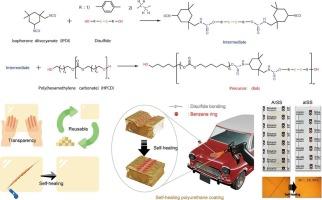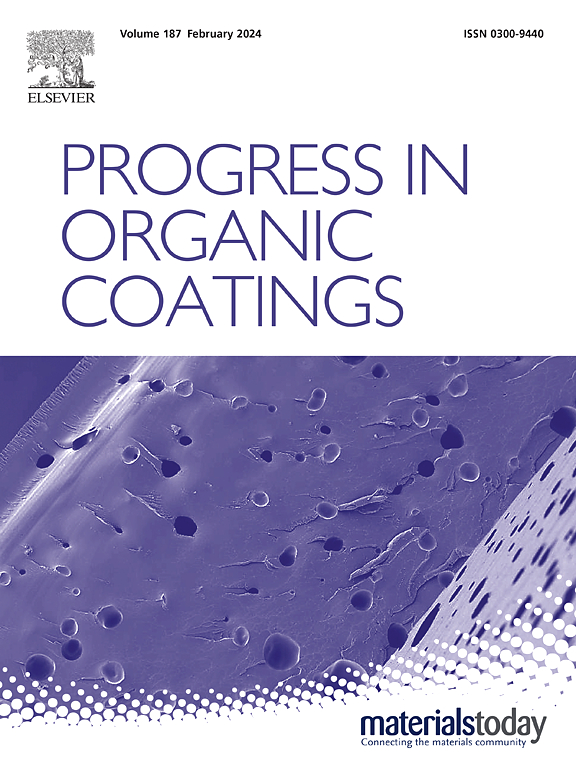基于具有热稳定性的聚氨酯的自修复喷漆涂料:二硫化物和二异氰酸酯的影响
IF 6.5
2区 材料科学
Q1 CHEMISTRY, APPLIED
引用次数: 0
摘要
随着人们对自愈合和抗划伤涂层的兴趣日益浓厚,有关在保护性弹性涂层材料中加入动态共价键的研究也日益增多。在聚氨酯(PU)弹性体中加入可逆二硫键可赋予其自愈合性能和可回收性,这不仅能降低维护成本,还能延长涂层产品的使用寿命。在这项研究中,我们开发出了具有优异愈合性能和热稳定性的双组分自愈合聚氨酯喷漆材料。这项成果涉及合成含有不同分子量二硫化物的聚氨酯低聚物前体二元醇,并控制最终喷涂材料中的固化剂比例。根据芳香族和脂肪族分子中二硫化物的类型以及二异氰酸酯的组合,研究了涂膜划痕愈合能力和稳定性的变化。在测试的试样中,由 H13 前体(异佛尔酮二异氰酸酯:双(4-羟基苯基)二硫化物:碳酸酯类软二醇的摩尔进料比 = 10:5:8)与固化剂(亚甲基二苯基二异氰酸酯:异佛尔酮二异氰酸酯的摩尔比 = 1:1)固化而成的涂膜表现出优异的愈合性能,在 30 °C 下 2 小时内刮痕恢复率达到 95%。它还具有透明度、耐溶剂性和热稳定性。本文章由计算机程序翻译,如有差异,请以英文原文为准。

Self-healable spray paint coatings based on polyurethanes with thermal stability: Effects of disulfides and diisocyanates
As the interest in self-healing and scratch-resistant coatings has increased, studies on incorporating dynamic covalent bonds in protective elastomeric coating materials have increased. The incorporation of reversible disulfide bonds into polyurethane (PU) elastomers imparts self-healing property and recyclability, which not only reduce maintenance costs but also extend the service lives of the coated products. In this study, we developed two-component self-healing PU spray paint materials with superior healing properties and thermal stability. This achievement involved the synthesis of oligomeric precursor diols of PU incorporating disulfides of different molecular weights and controlling the hardener ratio in the final spray-coating material. Variations in the scratch-healing ability and stability of the coating films were investigated based on the type of the disulfide employed in the aromatic and aliphatic moieties and the combination of diisocyanates. Among the tested specimens, a coating film fabricated from a precursor denoted as H13 (molar feed ratio of isophorone diisocyanate:bis(4-hydroxyphenyl)disulfide:carbonate-type soft diol = 10:5:8) cured with a hardener (molar ratio of methylene diphenyl diisocyanate:isophorone diisocyanate = 1:1) showed excellent healing performance, showing >95 % scratch recovery within 2 h at 30 °C. It also exhibited transparency, solvent resistance, and thermal stability.
求助全文
通过发布文献求助,成功后即可免费获取论文全文。
去求助
来源期刊

Progress in Organic Coatings
工程技术-材料科学:膜
CiteScore
11.40
自引率
15.20%
发文量
577
审稿时长
48 days
期刊介绍:
The aim of this international journal is to analyse and publicise the progress and current state of knowledge in the field of organic coatings and related materials. The Editors and the Editorial Board members will solicit both review and research papers from academic and industrial scientists who are actively engaged in research and development or, in the case of review papers, have extensive experience in the subject to be reviewed. Unsolicited manuscripts will be accepted if they meet the journal''s requirements. The journal publishes papers dealing with such subjects as:
• Chemical, physical and technological properties of organic coatings and related materials
• Problems and methods of preparation, manufacture and application of these materials
• Performance, testing and analysis.
 求助内容:
求助内容: 应助结果提醒方式:
应助结果提醒方式:


